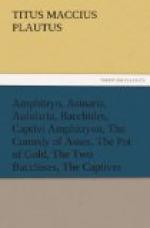you gentlemen who do own enough property to
pay taxes on, let me discharge my debt—
none of the credit system for me.
fugitivos ille, ut dixeram ante, huius patri domo quem profugiens dominum abstulerat vendidit. is postquam hunc emit, dedit eum huic gnato suo peculiarem, quia quasi una aetas erat. 20 hic nunc domi servit suo patri, nec scit pater; enim vero di nos quasi pilas homines habent.
That runaway slave, as I said before, stole his young master when he decamped and sold him to this (indicating Philocrates) man’s father. This gentleman, on buying the boy, gave him to this son of his for his very own, the two being of about the same age. Now here he is, back home, his own father’s slave without his father knowing it. Ah yes, the gods use us mortals as footballs!
rationem habetis, quo modo unum amiserit. postquam belligerant Aetoli cum Aleis, ut fit in bello, capitur alter filius: medicus Menarchus emit ibidem in Alide. coepit captivos commercari hic Aleos, si quem reperire possit qui mutet suom, illum captivom: hunc suom esse nescit, qui domist.
Well, you comprehend the way in which he lost one son. Later, when war broke out between the Aetolians and Eleans, the other son was taken prisoner—a common occurrence in times of war—and a doctor, Menarchus, in that same Elis, bought the young man. Hegio then began to buy up Elean captives, hoping to get hold of one that he could exchange for his son—the captive son, that is: for he has no idea that this man at his home is his own child.
et quoniam heri indaudivit, de summo loco 30 summoque genere captum esse equitem Aleum, nil pretio parsit, filio dum parceret: reconciliare ut facilius posset domum, emit hosce e praeda ambos de quaestoribus.
And inasmuch as he heard it rumoured yesterday that an Elean knight of the very highest rank and family connections had been captured, he had no thought of saving money if only he could save his son. So in the hope of getting that son back home more readily he bought both of these prisoners from the commissioners who were disposing of the spoils.
hisce autem inter sese hunc confinxerunt dolum. quo pacto hic servos suom erum hinc amittat domum. itaque inter se commutant vestem et nomina; illic vocatur Philocrates, hic Tyndarus: huius illic, hic illius hodie fert imaginem.
These same prisoners, however, have got together and laid a scheme, as you can see, to the end that the slave here (indicating Tyndarus) may send his master off home. Accordingly, they have exchanged clothes and names with each other. That one (indicating Tyndarus) is calling himself Philocrates, and this one (indicating Philocrates) Tyndarus: each is posing as the other for the time being.




